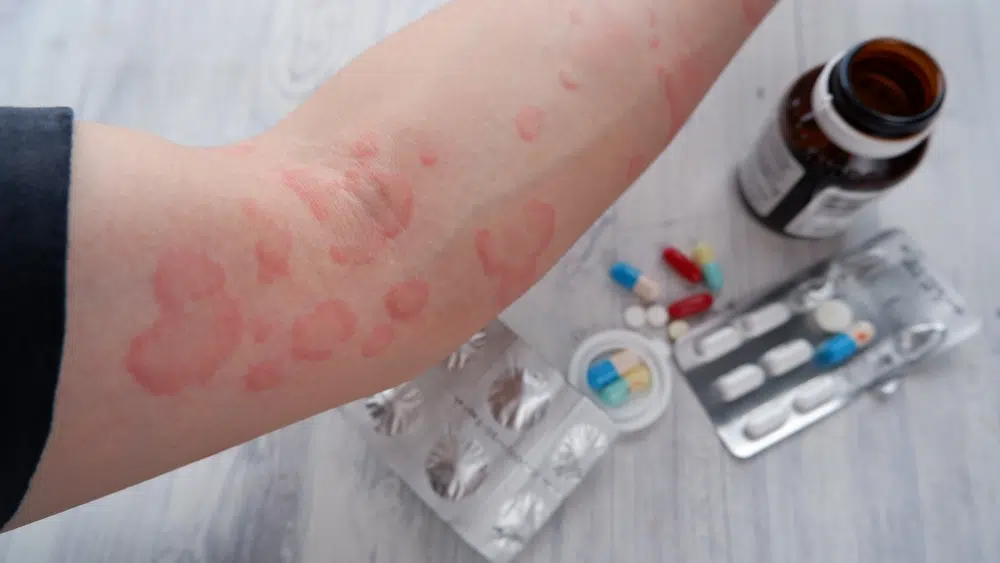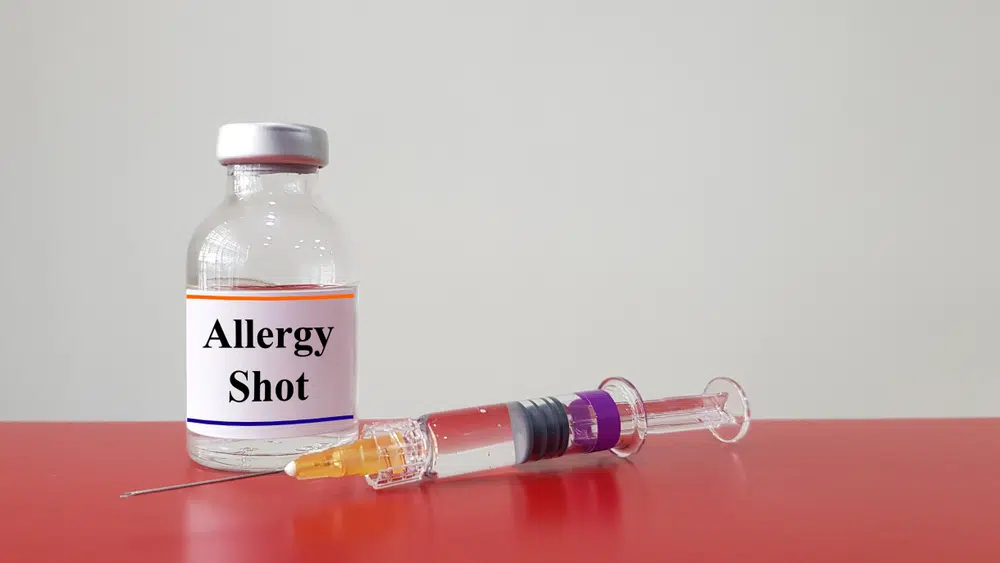If you’ve ever had a bad reaction to medicine, you know how confusing and even a little scary it can be. Maybe it was just a rash, or maybe it felt a lot more serious — either way, it’s not something you want to deal with alone. That’s why learning some basics about drug allergy self-care can really make a difference.
This blog isn’t here to overwhelm you with medical jargon. It’s just real talk about how to take care of yourself when your body reacts to a medication. From small at-home tips to knowing when to get help, you’ll find simple ways to stay safe and feel better — even when things get a bit rough.

What Is the Best Drug Allergy Rash Treatment at Home?
The best drug allergy rash treatment at home involves stopping the medication immediately and using soothing remedies to relieve symptoms while monitoring for any signs of escalation.
- Stop the medication that triggered the reaction right away.
- Take an over-the-counter antihistamine like cetirizine or loratadine to reduce itching and hives.
- Apply a cool compress to calm irritated or inflamed skin.
- Use calamine lotion to soothe itchiness and promote skin comfort.
- Wear a medical alert bracelet and notify your doctor to prevent future reactions.
How Can You Tell If You’re Allergic to a Medicine?
Let’s be real — taking a new medication can be a little nerve-wracking. Maybe you feel weird after, and you’re left wondering: “Is this normal, or is something wrong?” If your body starts reacting, it might be a drug allergy, and it’s important to know the difference between that and just feeling off.
What Are the Signs of a Drug Allergy?
Here are some common signs that your body might be having an allergic reaction to a medicine:
- Itchy bumps (hives) or a rash that spreads
- Swelling, especially on your face, lips, or throat
- Tight chest or trouble breathing
- Feeling faint or lightheaded
- A sudden feeling of panic or fear, out of nowhere
If anything like this shows up, stop taking the medication and call your doctor. Don’t wait to see if it gets worse.
What If It’s Just a Normal Reaction — Not an Allergy?
Not every reaction means you’re allergic. Sometimes your body is just adjusting, or the medication is causing a common side effect. Here’s a quick way to tell the difference:
| More like an allergy | More like a regular reaction |
|---|---|
| Rash or hives | Upset stomach |
| Swelling or tight throat | Feeling sleepy or dizzy |
| Breathing issues | Headache or dry mouth |
Still not sure? That’s totally okay. Your doctor can help figure it out with questions — or a simple allergy test if needed.
When Should You Ask for Help?
Right away — if you’re seeing any of these:
- A rash that gets worse, not better
- Swelling that affects your breathing or talking
- Feeling faint, confused, or like your heart’s racing
- Wheezing, chest tightness, or fast breathing
If it feels serious, trust your gut. Don’t try to wait it out. Getting help early can make a big difference.
What Should You Do First If You Notice a Mild Reaction?
If you spot a rash, feel itchy, or your skin starts to burn after taking medicine, don’t ignore it. These might be early signs of a drug allergy. If you’ve had allergic reactions in the past, it’s especially important to take these symptoms seriously.
For mild symptoms — like itching, light rashes, or a slightly stuffy nose — there are safe ways to treat them at home.

Can You Take Medicine at Home for a Mild Drug Allergy?
Yes, for mild symptoms, over-the-counter antihistamines can help. These are allergy meds you can buy without a prescription. But it’s good to know the difference between types:
- First-generation antihistamines (like diphenhydramine/Benadryl)
→ Work well but might make you sleepy - Second-generation antihistamines (like loratadine or cetirizine)
→ Help with itching or hives but usually won’t make you drowsy
Tip: Always read the label and follow the dosage. If you’re taking other meds, check with a pharmacist or your doctor to make sure there’s no conflict.
How Can You Stay Safe While Treating Mild Reactions?
Even if the reaction seems small, it’s smart to keep an eye on how your body responds:
- Check your symptoms regularly — if things start to get worse, call a doctor
- Let someone know you’re having a reaction, just in case
- Watch for warning signs like swelling, fast heartbeat, or trouble breathing
If anything starts to feel scary or intense — don’t wait. Go straight to urgent care or call emergency services. Mild symptoms can sometimes turn serious, and getting help fast matters.


What Should You Do If a Drug Allergy Becomes Serious?
Some allergic reactions can turn dangerous really fast — and knowing the signs can literally save your life. One of the most serious reactions is called anaphylaxis. It comes on quickly and needs emergency treatment right away.
Here are signs to watch for:
- Trouble breathing or throat tightening
- Sudden drop in blood pressure (you might feel dizzy or faint)
- Fast heartbeat
- A sudden wave of panic or fear
- Stomach pain, vomiting, or skin reactions
If you notice these symptoms — in yourself or someone else — don’t wait. Act fast.
How Do You Treat a Severe Drug Allergy Reaction Like Anaphylaxis?
The first and most important step is using an epinephrine auto-injector (like an EpiPen) if one is available. Epinephrine helps open your airways and brings your blood pressure back up. It works fast and can be life-saving.
If you’ve had serious allergic reactions before, you should always carry an epinephrine auto-injector — and know how to use it.
What Should You Do While Waiting for Emergency Help?
After using epinephrine, call 911 right away — even if you start feeling better. You still need medical care.
While waiting:
- Check breathing — is the person conscious and breathing okay?
- Lay them on their back and raise their legs if they’re dizzy (helps with blood flow)
- Turn them on their side if they’re vomiting
- Keep them warm with a blanket or jacket
- Stay calm and reassuring — it helps lower panic and shock

A proper diagnosis is the first step toward a symptom-free life
Don’t wait! Schedule your allergy evaluation with Becker ENT & Allergy in Philadelphia or New Jersey.
What Happens After a Severe Reaction?
Doctors might run tests — like a drug challenge — to figure out what caused the reaction. In some cases, especially with important medications like chemo drugs, you might go through a process called desensitization to take the drug safely in the future.
🩺 Bottom line: you’re not alone in this. There are ways to stay safe, get answers, and still get the treatment you need.
Soothing Skin Allergic Reactions from Drug Allergies
Correct skin care and home treatments help to reduce medication allergy skin irritations. Using oatmeal baths or a cool compress will assist to ease inflamed, itching skin. Another quick fix is aloe vera gel.
Topical steroids can be effective for controlling skin rash if home treatments are insufficient. These creams, while beneficial for reducing inflammation, should be applied following a healthcare provider’s advice to avoid side effects.
For ongoing management, choose soaps and lotions free from fragrances or harsh chemicals that could aggravate the skin. Incorporate hypoallergenic products daily, especially after a positive allergy skin test. Wearing protective clothing can help those with skin prick sensitivity.
Consult a healthcare provider about skincare routines and skin testing to prevent further skin reactions. Regular care promotes healing and may prevent future issues.
- Use cool compresses or oatmeal baths for relief
- Apply aloe vera gel for localized itching
- Consider topical steroids under medical supervision for severe reactions
- Use hypoallergenic skin care products
- Wear protective clothing if necessary
- Consult healthcare provider for skin testing and personalized advice
Safe Management of Respiratory Symptoms
Breathing techniques can improve comfort and lung function for those with respiratory symptoms. Regular practice of exercises like pursed-lip and diaphragmatic breathing can be beneficial. Here’s how to perform them effectively:
- Inhale through the nose, focusing on moving the belly, not the chest.
- Exhale slowly through pursed lips, longer than the inhalation.
These methods can help manage breathing difficulties and should be done consistently.
Medications, including anti-inflammatory drugs via inhalers, play a key role in treating aggravated respiratory symptoms, which may result from reactions to medications like sulfa drugs or nonsteroidal anti-inflammatory drugs. Use inhalers properly by:
- Vigorously shaking the inhaler.
- Fully exhaling, placing the inhaler in the mouth, and then inhaling slowly as you depress the canister.
- Holding the breath for 10 seconds to let the medication disperse in the lungs.
Always consult a healthcare provider before making changes to your regimen, especially if you suspect drug allergies.
Be vigilant for signs that respiratory symptoms are worsening, such as increased difficulty breathing, trouble performing daily tasks, or needing your inhaler more often. If these symptoms arise, seek immediate medical attention. Quick response is essential for managing the condition and ensuring the health of your lungs.
Reducing Future Risks
Monitoring with an Allergy Diary
To manage drug allergies effectively, it is helpful to use a diary. Record every medication, including the name, dosage, and any negative reactions in this diary. This helps identify which suspect drug may be causing the allergy.
Identifying the Allergic Drug
Drug allergy tests can help determine the exact cause. These include skin tests or drug challenges under medical supervision. Drug desensitization could be useful for certain people, especially if non-antibiotic drugs have caused allergic reactions.
Engaging with Healthcare Professionals
Having clear communication with healthcare providers is essential. Inform them about any known drug allergies. They can assist in choosing the right drug allergy treatments and safely prescribe alternatives. Additionally, they can address questions, such as whether drug allergies are contagious.
By working with medical professionals and keeping a detailed record, you can manage your allergies and minimize future risks from prescription drugs.
Advice for Managing Drug Allergies
Finding Alternative Medications
For those with drug allergies, alternative medications may offer a safer option. Herbal medications are a possible natural replacement but should be chosen carefully to avoid less-appropriate or more expensive drugs. Consult with health professionals to determine the treatments that bypass allergy-causing drugs without losing effectiveness.
Importance of Health Monitoring
Health monitoring is essential in controlling drug allergies. Frequent checks to assess the effects of medications can catch harmful reactions swiftly. Inform your healthcare providers about all used substances, including over-the-counter and herbal treatments, to protect your health efficiently.
Steps for Allergy-Proofing Your Space
Reducing exposure to allergens at home can help prevent allergic incidents. Simple actions to allergy-proof your environment include:
- Using HEPA filters for cleaner air.
- Choosing hypoallergenic bedding.
- Limiting dust and animal dander.
- Selecting fragrance-free, non-toxic cleaners.
Together, these measures and wise choices regarding medications and treatments create a solid approach to safely managing drug allergies.
For expert guidance and personalized care for managing drug allergies, schedule a consultation with our experts at Becker ENT & Allergy today. Your health and safety are our top priority.
Why Choose Us for Your Drug Allergy Treatment?
When you’re dealing with a drug allergy, it’s not just about finding quick relief — it’s about feeling safe, heard, and supported every step of the way. At Becker ENT & Allergy, we understand how scary it can be when your body reacts to a medication. You don’t have to figure it out alone.
Here’s why patients trust us with their care:
- You get real answers. We use the latest testing methods to identify drug allergies accurately — no guesswork, no unnecessary medication avoidance.
- Personalized self-care plans. From at-home skin relief to emergency action plans, we’ll help you build a strategy that works for your life.
- Support beyond the appointment. Our team is here when you need follow-up, new symptoms, or just some reassurance.
- Safe, expert care. Whether you need desensitization for an important treatment or help finding a safe medication alternative, our specialists have your back.

